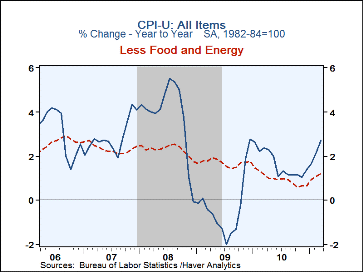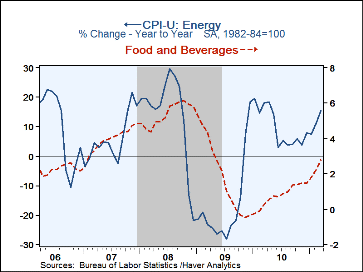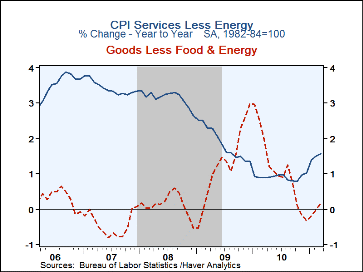 Global| Apr 15 2011
Global| Apr 15 2011U.S. CPI Gains With Energy
by:Tom Moeller
|in:Economy in Brief
Summary
Higher energy prices raised March inflation as they did in February. The Commerce Department indicated that the Consumer Price Index rose 0.5% in March following a like gain in February. The increase matched Consensus expectations. [...]
 Higher energy prices raised March inflation as they did in February.
The Commerce Department indicated that the Consumer Price Index rose 0.5% in
March following a like gain in February. The increase matched Consensus expectations.
The y/y price rise of 2.7% was the strongest since December 2009
and the three-month increase of 6.1% (AR) was the firmest since mid-2008.
Core price inflation showed less forward momentum. The CPI less
food & energy rose 0.1% but the gain fell short of an expected 0.2%
rise. Nevertheless, the y/y increase of 1.2% was the firmest since last
February and the 2.0%
three-month increase was the strongest since late-2009.
Higher energy prices raised March inflation as they did in February.
The Commerce Department indicated that the Consumer Price Index rose 0.5% in
March following a like gain in February. The increase matched Consensus expectations.
The y/y price rise of 2.7% was the strongest since December 2009
and the three-month increase of 6.1% (AR) was the firmest since mid-2008.
Core price inflation showed less forward momentum. The CPI less
food & energy rose 0.1% but the gain fell short of an expected 0.2%
rise. Nevertheless, the y/y increase of 1.2% was the firmest since last
February and the 2.0%
three-month increase was the strongest since late-2009.
Energy prices again led with a 3.5% increase. Home heating oil prices increased 6.2% (34.0% y/y) while gasoline prices rose 5.6% (27.5% y/y). Prices for natural gas & electricity ticked up 0.2% but fell 0.5% y/y. Food & beverage prices rose a strong 0.7%. The gain was raised by a 1.1% increase in meat, poultry, fish & eggs (7.9% y/y) and by a 1.3% gain (3.7% y/y) in dairy products.
For goods alone, core prices rose 0.1% led by a 0.8% increase in motor vehicles (1.3% y/y). Apparel prices fell 0.5% (-0.6% y/y) for the second down month while prices for household furnishings & operation slipped 0.1% (-1.6% y/y).
Pricing power for core services improved again, posting a 0.2% (1.6% y/y) increase. Higher public transportation costs continued to lead with a 1.3% increase (10.5% y/y). Education costs rose 0.3% (4.0% y/y) while medical care service prices ticked up 0.1% (2.7% y/y). Shelter costs, which are 32% of the CPI, rose 0.1% for the sixth straight month and the y/y change improved to 0.9% due to declines early last year. Owners equivalent rent of primary residences, a measure not equivalent to other house price measures, again nudged up 0.1% while the y/y increase improved to 0.8% after no change last year. Nevertheless, the reading remained nearly the weakest since the series' start in 1983.
The chained CPI, which adjusts for shifts in consumption patterns, jumped 0.9% and 2.5% year-to-year. Chained prices less food & energy increased 0.3% m/m and by 0.9% y/y.
The consumer price data is available in Haver's USECON database while detailed figures can be found in the CPIDATA database. The expectations figure is the AS1REPNA database.
| Consumer Price Index (%) | Mar | Feb | Jan | Mar Y/Y | 2010 | 2009 | 2008 |
|---|---|---|---|---|---|---|---|
| Total | 0.5 | 0.5 | 0.4 | 2.7 | 1.6 | -0.3 | 3.8 |
| Total less Food & Energy | 0.1 | 0.2 | 0.2 | 1.2 | 1.0 | 1.7 | 2.3 |
| Goods less Food & Energy | 0.1 | 0.2 | 0.2 | 0.2 | 1.1 | 1.3 | 0.1 |
| Services less Energy | 0.2 | 0.2 | 0.1 | 1.6 | 0.9 | 1.9 | 3.1 |
| Energy | 3.5 | 3.4 | 2.1 | 15.5 | 9.6 | -18.2 | 13.7 |
| Food & Beverages | 0.7 | 0.5 | 0.5 | 2.9 | 0.8 | 1.9 | 5.4 |
| Chained CPI: Total (NSA) | 0.9 | 0.5 | 0.5 | 2.5 | 1.5 | -0.1 | 3.7 |
| Total less Food & Energy | 0.3 | 0.4 | 0.1 | 0.9 | 0.7 | 1.5 | 2.0 |
Tom Moeller
AuthorMore in Author Profile »Prior to joining Haver Analytics in 2000, Mr. Moeller worked as the Economist at Chancellor Capital Management from 1985 to 1999. There, he developed comprehensive economic forecasts and interpreted economic data for equity and fixed income portfolio managers. Also at Chancellor, Mr. Moeller worked as an equity analyst and was responsible for researching and rating companies in the economically sensitive automobile and housing industries for investment in Chancellor’s equity portfolio. Prior to joining Chancellor, Mr. Moeller was an Economist at Citibank from 1979 to 1984. He also analyzed pricing behavior in the metals industry for the Council on Wage and Price Stability in Washington, D.C. In 1999, Mr. Moeller received the award for most accurate forecast from the Forecasters' Club of New York. From 1990 to 1992 he was President of the New York Association for Business Economists. Mr. Moeller earned an M.B.A. in Finance from Fordham University, where he graduated in 1987. He holds a Bachelor of Arts in Economics from George Washington University.
More Economy in Brief
 Global| Feb 05 2026
Global| Feb 05 2026Charts of the Week: Balanced Policy, Resilient Data and AI Narratives
by:Andrew Cates








